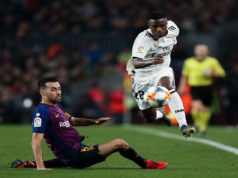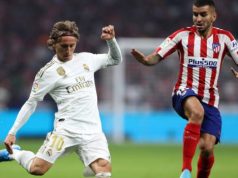In the modern theatre that is football, La Liga has played host to some of the best players in the history of the game. Today, we find ourselves dazzled by the individual brilliance of Cristiano Ronaldo and Lionel Messi, but neither of them have been able to connect with Spain’s international audience in the same way as Raul.
Despite the regional tensions and fanatical divisions, notably Catalan, Basque and Castilian, Raul managed to unify a disjointed nation in a way perhaps comparable to the collapse of the Franco dictatorship!
Born into a family that lived and breathed Atletico Madrid, Raul Gonzalez Blanco arrived at the Vicente Calderon stadium in 1990 only to find his beloved club had a limited interest in developing youth players. After the entire academy system was scrapped by then president Jesus Gil, Raul had barely time to recover before Real Madrid swooped in and unfurled a metaphorical safety net.
Unhindered by this rejection, Raul put in long hours and invested a lot mentally to be good enough for Real Madrid’s Cadete. His hard work saw him grab the attention of then coach Jorge Valdano, who discussed the possibility of fielding the young striker at the tender age of 17. Raul made it clear to Valdano that he was mentally prepared for the top tier of Spanish football, and as a result made his competitive debut for Real Madrid in 1994.
He came onto the scene at Madrid just as Emilio Butragueño was taking his leave. Easily regarded as one of the best strikers of his generation, expectation was heaped on Raul’s shoulders to live up to Butragueño and the glorious career he’d had at the Santiago Bernabeu. Raul scored the first of many league goals in his second competitive appearance against, surprise surprise, Atletico Madrid. Unable to hide his emotions after so much hard work and promise had culminated in nothing at his dream club, Raul ran straight to the touchline to embrace those who’d made it all possible.
Raul finished the 1994-95 season with ten goals, an impressive tally for a player who hadn’t even turned 18. It would turn out to be his lowest return for a decade. His goals, combined with the 28 scored by Ivan Zamorano’s, ensured Los Blancos lifted the La Liga title and marked the beginning of a new chapter in the club’s history. Raul won La Liga’s Breakthrough Player award in what was a terrific start to a magical career full of bright lights, twinkling trophies and sadly, at the end, a sourness that will surely be removed with time.
European football would prove challenging the following season; particularly on the young Raul. However, he responded to the pressure with goals and yet more goals. He added ten to his debut season total and ran riot in the Champions League, finally ending the season with 26 goals and picking up the Zarra Trophy for the first time. Despite his exploits, Real Madrid finished in sixth and missed out on Europe.
Despite being embittered by Atletico Madrid’s double over them, Real Madrid responded brilliantly and in particular Raul, who was briefly freed of the pressure to perform on the European stage. He finished the season with 22 goals and once again lifted the La Liga title. The victory was made all the more sweet when they beat hated rivals Barcelona 5-3 on aggregate in the Supercopa de Espana, with Raul bagging three.
Having shot to stardom, the young striker could afford to take his foot off the accelerator and have what was, comparatively, a quiet season by his standards. In fact, his total of 15 goals seems so nonchalant that it’s amazing it was the season Real Madrid won the Champions League after 30 years without winning the prestigious trophy. These represented some of the best years for Raul on a personal level as his strike partner Fernando Morientes, a year older than Raul, gave him a sense of tranquility on the field.
After just a few seasons, Raul had won everything there was to win for his club side, but he found success on the international stage not forthcoming. Despite scoring 44 goals for Spain, his efforts were largely unrewarded and even his goal scoring record has been surpassed by David Villa. Having inherited the captaincy from Real Madrid legend Fernando Hierro, Raul was eventually usurped by Fernando Torres, dividing fans who either thought the decision was outrageous or saw it as a necessary intervention.
Spain have since won back-to-back trophies, leaving an embittered Raul out of the picture, yet, ever the gentlemen, Raul has made clear his pleasure at seeing Spain winning at the personal cost of his exclusion. The grace with which Raul has taken his sudden axing is a testament to his character and personality. Despite these unsightly events and those that surrounded his departure from Real Madrid, El Niño will forever be immortalised by Spain and will continue to be associated with La Roja.
Back in Madrid, the trophies continued to flood in as Raul’s goals just kept coming. Four more La Liga titles and two more Champions League trophies topped off a fantastic career and a splendid era for Los Blancos. However the Bernabeu’s champion began suffering a series of injuries including an excruciating bout of appendicitis which eventually saw the striker hospitalised. At the same time, Florentino Perez began the Galacticos project which alienated Raul and put his Madrid career into question.
Although he was one of the club’s better earners, the chasm that had been created in the dressing room as a result of wages really effected Raul, not that it effected his goal scoring, but he felt the club was moving in a less dignified direction. With all the big players to have arrived, Raul continued to shine so very brightly and closed in on Alfredo Di Stefano’s scoring record for the club. He scored the opening goal in the 2001-02 Champions League final but found he was eclipsed by Zinedine Zidane’s incredible volley.
On 15th Feburary 2009, Raul scored his 229th goal against Sporting Gijon, thus breaking Di Stefano’s record. It was a truly remarkable achievement and the veteran striker showed why he deserved a ‘contract for life’ at the Santiago Bernabeu. Several months on, Raul surpassed Manuel Sanchis’ league appearance record for the club, affirming what a loyal servant he had been. Sadly for the Spaniard, his time in his home country was numbered.
In the 2009-10 season, Raul played his final game for Los Blancos. The date was 24th April 2010 and the venue was La Romereda, Zaragoza’s ground and also where Raul had made his first La Liga appearance. He’d replaced the injured Rafael van der Vaart but found he had his own injury concerns shortly after. Forced to play on, Raul lumbered into the box and managed to get on the end of Cristiano Ronaldo’s cross to score his last goal for Real Madrid. Shortly after, he signalled to the bench to be substituted.
It would be an injury that the striker would struggle to recover from and on 25th April 2010, Raul announced his departure alongside fellow Madrid stalwart Guti. In doing so, the 33-year-old had ended a relationship that had lasted more than 16 years. Real Madrid had moulded Raul and brought him joy and tears in equal measure. He’d sweated, bled and fought desperately hard for the badge and the public held him aloft as their shining prince. His entire life had revolved around the success and failure of Madrid.
To the Spanish people, Raul was so much more then just a Real Madrid striker. He seemed to resonate with people on a national scale and even from rival team fan bases. For years Spain had been lacking a genuine ‘good guy’ character and one that they could be proud of. True, it was easier for him to gain the affection of his fellow Madridistas as Raul was easy to relate to. His value of key virtues such as working hard and comradery gave him huge appeal to the fans and gave them the belief that they could follow in his footsteps.
Raul developed a star status unique in a country divided. For years the Spanish national team had suffered as a result of regional preferences. If one year the team was dominated by Catalan players, then this would alienate people from the Madrid and central region of Spain and visa-verse. Raul was one of the first players to appease all parties. Spain’s victory in Euro 2008 was a bitter one for many as Raul, the man who had unified the Spanish team, had been offered up as the sacrificial lamb.
After a joyous two seasons in Germany with Schalke 04, Raul moved to Qatar signing for Al Saad. He scored nine goals in his first season to help his side win the their first league title in five years. With retirement on the horizon, Raul will undoubtedly be making his way back to the Santiago Bernabeu to continue his story with Los Blancos. Although a position has yet to be made clear, Raul Gonzalez Blanco will certainly be back soon.
Follow Louis Gibberd-Thomas on Twitter: @mercutio156




